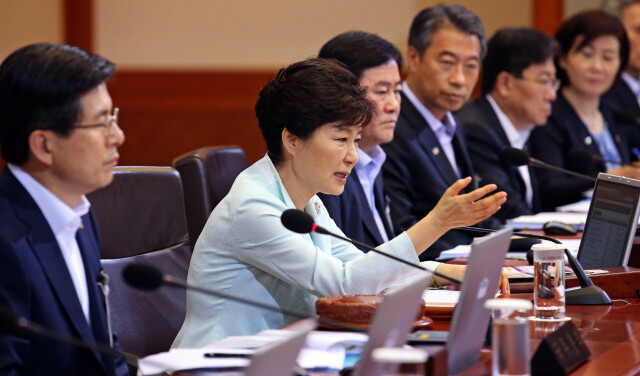hankyoreh
Links to other country sites 다른 나라 사이트 링크
Pres. Park announces reforms in four major areas

On July 21, President Park Geun-hye announced that reforms in the four areas of the public sector, labor, finance, and education were the primary task of her administration for the second half of the year and indicated her resolve to carry these out.
With the Middle East Respiratory Syndrome (MERS) outbreak all but over and the administration‘s grip on the ruling party tightening, Park seems intent on introducing major reforms to achieve some results in the second half of her term.
Responding to rumors that some cabinet members might step down and return to the National Assembly before the general election next year, Park openly warned them to “set aside their personal plans and focus on reforms and the country.” However, she made no remarks about the hacking scandal in which the National Intelligence Service is embroiled.
“In order to fix bad practices that have continued for a long time and to fundamentally strengthen the temperament of our economy, I am pursuing structural reforms in the four areas of the public sector, labor, finance, and education,” Park said during the cabinet meeting that was held at the Blue House on Tuesday.
Park went on to explain the need for reform in these four areas and each of the main tasks that this reform will involve. While repeating the necessity of structural reform in the area of labor - which has recently provoked the opposition of labor advocates - Park said that this reform would involve introducing the wage peak system, narrowing the gap between the wages of regular and irregular workers, and increasing the flexibility of the labor market.
During the cabinet meeting on Tuesday, Park strongly urged the ministers of the departments in question to carry out the reform initiatives. “We must continue to reflect on why we are doing these things. We all know this, but we need to ponder it once more, just as sailors watch the lighthouse during a nighttime voyage,” she said.
Since there are no nationwide elections until the general election next April, this year has been regarded as an ideal time to push ahead with major reform initiatives on sensitive issues that various interest groups are at odds over. Park appears to be accelerating her efforts because little has been accomplished thus far this year except for passing a bill about public servants’ pension and because of concerns that her control over the government will slip as the general election approaches.
Park is also trying to rein in cabinet ministers who were originally members of the National Assembly by ending nearly every remark with the reminder that “once you have taken on a job, it is your clear duty to do your best to make sure that that job goes well.”
Park made a similar warning during the cabinet meeting on July 7. “None of you should be following an independent course of action. I hope that all of you will do your best, solely dedicated to serving the public,” she said.
Cabinet ministers who are lawmakers with the Saenuri Party and are expected to run for reelection next year include Finance Minister and Deputy Prime Minister Choi Kyoung-hwan, Education Minister and Deputy Prime Minister Hwang Woo-yea, Minister of Oceans and Fisheries Yoo Ki-june, Minister of Land, Infrastructure, and Transport Yoo Il-ho, and Minister of Gender Equality and Family Kim Hee-jung.
On Tuesday, when Park asked Prime Minister Hwang Kyo-ahn about plans for “normalizing the abnormal” and eradicating corruption, Hwang promised to “devise comprehensive countermeasures by operating task forces for every kind of corruption in areas that are closely connected with the public livelihood.”
Along with this, Hwang said that he would operate a system that would constantly monitor various contracts and budget execution for large government projects and restore the ability of ministries to carry out internal audits in order to eliminate irregularities and corruption, Blue House Spokesperson Min Kyung-wook said.
By Choi Hye-jeong, staff reporter
Please direct questions or comments to [english@hani.co.kr]

Editorial・opinion
![[Editorial] Japan’s rewriting of history with Korea has gone too far [Editorial] Japan’s rewriting of history with Korea has gone too far](https://flexible.img.hani.co.kr/flexible/normal/500/300/imgdb/original/2024/0422/1717137715201877.jpg) [Editorial] Japan’s rewriting of history with Korea has gone too far
[Editorial] Japan’s rewriting of history with Korea has gone too far![[Column] The president’s questionable capacity for dialogue [Column] The president’s questionable capacity for dialogue](https://flexible.img.hani.co.kr/flexible/normal/500/300/imgdb/original/2024/0422/1517137717613239.jpg) [Column] The president’s questionable capacity for dialogue
[Column] The president’s questionable capacity for dialogue- [Column] Are chaebol firms just pizza pies for families to divvy up as they please?
- [Column] Has Korea, too, crossed the Rubicon on China?
- [Correspondent’s column] In Japan’s alliance with US, echoes of its past alliances with UK
- [Editorial] Does Yoon think the Korean public is wrong?
- [Editorial] As it bolsters its alliance with US, Japan must be accountable for past
- [Guest essay] Amending the Constitution is Yoon’s key to leaving office in public’s good graces
- [Editorial] 10 years on, lessons of Sewol tragedy must never be forgotten
- [Column] A death blow to Korea’s prosecutor politics
Most viewed articles
- 1Korean government’s compromise plan for medical reform swiftly rejected by doctors
- 2[Column] The president’s questionable capacity for dialogue
- 3[Editorial] Japan’s rewriting of history with Korea has gone too far
- 4Samsung barricades office as unionized workers strike for better conditions
- 5[Reporter’s notebook] Did playing favorites with US, Japan fail to earn Yoon a G7 summit invite?
- 6[Column] The clock is ticking for Korea’s first lady
- 7Korea protests Japanese PM’s offering at war-linked Yasukuni Shrine
- 8All eyes on Xiaomi after it pulls off EV that Apple couldn’t
- 9[Column] Are chaebol firms just pizza pies for families to divvy up as they please?
- 10What Israel’s ‘warning shot’ response to Iran means for Middle East tensions